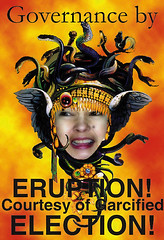Only Real Men Cry
Heart to Heart Talk
Only real men cry
By Dr. Philip S. Chua
Cebu Daily News
First Posted 16:44:00 03/10/2008
Jun Lozada’s testimony before the Senate on the NBN-ZTE kickback scandal was punctuated with episodes of uncontrolled tearful emotions. The insensitive, callous, impertinent, and arrogant lawyer of Gloria Arroyo, Atty. Sergio Apostol made a racist remark against star witness Lozada, denigrating him as a “crying boy,” and sarcastically stating that this “probinsyanong intsik should be deported to China for being a trouble-maker.”
Should men cry? Or, should this act be a sole monopoly of women, babies and little boys, as the convention seems to suggest?
Heartless, cold, and brutal men, like Apostol, who bask in the midst of corrupt public officials he is protecting, seems to have lost his soul, and, obviously do not cry “because he is a man.” Or, is he?
Medically speaking, men do cry, when the situation or his emotion demands this natural act, because he is a normal human being. He has feelings, compassion, and tenderness, just like a normal woman does. Yes, men do cry all over the world.
A survey in London says “British men are abandoning their stiff upper lips but still do not wear their hearts on their sleeves like Americans … When it comes to raw emotion, the once buttoned-up Brits are now happy to shed tears quite openly--but Italians can still ‘out-sob’ them.” French and Greeks also express their emotions freely, without misplaced, artificial, unnecessary and terribly unhealthy constraint.
In the survey of 2,000 people, very few had seen their father cry, compared to twice as many today. Seventy five percent of men polled considered crying in public acceptable. Ron Bracey, clinical psychologist concurred with the survey results. There is no question that a repressed emotion is not good for the human being, and that it leads to one degree of depression or another, not to mention the other adverse psychological impact it has on the individual.
Yes, men do cry. Only real men do, those with the balls, the guts, the courage, and the confidence in their masculinity cry.
Which men would not shed a tear hearing a dying mother saying goodbye to her young children, or seeing a child with an incurable disease, languishing in pain, or witnessing a helpless crippled old lady quietly crying and hugging her mortally wounded husband on the street following a hit-and-ran?
And who among us men would not get misty when we learn that the tumor in the body of a loved one was not cancer but a benign one after all? Or, after winning a sport tournament, a big contest, the lotto, or after your wife safely delivered a healthy baby following a risky pregnancy?
I don’t know about you guys out there, but more than three decades ago, I was surprised myself when my eyes welled (as my wife, Farida, competed with Niagara Falls) as we left our eldest child, Sheillah, at the Indiana University, Indianapolis, dorm for her freshman pre-med year. And I was even more than misty at her wedding. My excuse during my welcome remarks as father of the bride was that I cried in church because I thought of the huge bill from the Chicago Hilton for the reception that evening, and also, that I suddenly remembered we had three more daughters to go.
Anyway, I also could not help but allow a tear or two to fall when I watched The Notebook, Awakenings, Forrest Gump, Freedom Writers, and many other love stories. But two most uncontrollable emotions I had was when my Dad died, 46 years ago, and when my close friend, Dr. Feliciano Jimenez, passed away a year ago. Holding the tears back on those two occasions hurt, I had to let go.
As someone by the name Stew Frimer said, “Crying is a healthy response, not an emotional meltdown. It is not something to apologize for. Crying is a breakthrough, not a breakdown.”
Society has unfortunately instilled in us, from early childhood, that it is inappropriate for big boys and men to cry, only sissies cry, and that we, males, must always “stand up like a man.” Young boys were indoctrinated early on to accept pressures and pains “like a man” and to suppress their emotions, and to project masculinity, confidence and strength, “no matter what,” at the risk of being labeled and ostracized as a weakling, or gay, otherwise.
There is actually a biological difference between men and women, which could explain why their tear gland-thresholds vary. Men have less prolactin, a hormone produced by the pituitary gland, which controls emotional tears. Young males and females have the same amount of this hormone until about the age of 12. The level in boys goes down as the level of testosterone goes up. The corpus callosum of the brain links emotion with words. Among males, the connection appears to be slower than in women. It takes men longer to process emotions than women.
In his book, “Real Boys:” William Pollack, Ph.D. “suggests we adopt a new “boy code”... a code that respects emotions in boys and men, that is based on honesty rather than fear, communication rather than repression, and connection rather than disconnection.”
Today, modern values require (demand) men to “get in touch” with their emotions, and for them to be more sensitive and yet masculine and tough. As far as crying is concerned, the fact of the matter is, it takes a truly strong man to be able to cry, especially in public. Boys don’t cry, but real men do.
As for Jun Lozada, I fervently pray that his tears would someday soon cleanse our government of crooks and plunderers, and help save our people, most especially the 80 percent of Filipinos, the poorest of the poor, who are languishing in abject poverty.
With the sad state of our nation today, every decent Filipino anywhere around the world has every reason to shed tears.
By Dr. Philip S. Chua
Cebu Daily News
First Posted 16:44:00 03/10/2008
Jun Lozada’s testimony before the Senate on the NBN-ZTE kickback scandal was punctuated with episodes of uncontrolled tearful emotions. The insensitive, callous, impertinent, and arrogant lawyer of Gloria Arroyo, Atty. Sergio Apostol made a racist remark against star witness Lozada, denigrating him as a “crying boy,” and sarcastically stating that this “probinsyanong intsik should be deported to China for being a trouble-maker.”
Should men cry? Or, should this act be a sole monopoly of women, babies and little boys, as the convention seems to suggest?
Heartless, cold, and brutal men, like Apostol, who bask in the midst of corrupt public officials he is protecting, seems to have lost his soul, and, obviously do not cry “because he is a man.” Or, is he?
Medically speaking, men do cry, when the situation or his emotion demands this natural act, because he is a normal human being. He has feelings, compassion, and tenderness, just like a normal woman does. Yes, men do cry all over the world.
A survey in London says “British men are abandoning their stiff upper lips but still do not wear their hearts on their sleeves like Americans … When it comes to raw emotion, the once buttoned-up Brits are now happy to shed tears quite openly--but Italians can still ‘out-sob’ them.” French and Greeks also express their emotions freely, without misplaced, artificial, unnecessary and terribly unhealthy constraint.
In the survey of 2,000 people, very few had seen their father cry, compared to twice as many today. Seventy five percent of men polled considered crying in public acceptable. Ron Bracey, clinical psychologist concurred with the survey results. There is no question that a repressed emotion is not good for the human being, and that it leads to one degree of depression or another, not to mention the other adverse psychological impact it has on the individual.
Yes, men do cry. Only real men do, those with the balls, the guts, the courage, and the confidence in their masculinity cry.
Which men would not shed a tear hearing a dying mother saying goodbye to her young children, or seeing a child with an incurable disease, languishing in pain, or witnessing a helpless crippled old lady quietly crying and hugging her mortally wounded husband on the street following a hit-and-ran?
And who among us men would not get misty when we learn that the tumor in the body of a loved one was not cancer but a benign one after all? Or, after winning a sport tournament, a big contest, the lotto, or after your wife safely delivered a healthy baby following a risky pregnancy?
I don’t know about you guys out there, but more than three decades ago, I was surprised myself when my eyes welled (as my wife, Farida, competed with Niagara Falls) as we left our eldest child, Sheillah, at the Indiana University, Indianapolis, dorm for her freshman pre-med year. And I was even more than misty at her wedding. My excuse during my welcome remarks as father of the bride was that I cried in church because I thought of the huge bill from the Chicago Hilton for the reception that evening, and also, that I suddenly remembered we had three more daughters to go.
Anyway, I also could not help but allow a tear or two to fall when I watched The Notebook, Awakenings, Forrest Gump, Freedom Writers, and many other love stories. But two most uncontrollable emotions I had was when my Dad died, 46 years ago, and when my close friend, Dr. Feliciano Jimenez, passed away a year ago. Holding the tears back on those two occasions hurt, I had to let go.
As someone by the name Stew Frimer said, “Crying is a healthy response, not an emotional meltdown. It is not something to apologize for. Crying is a breakthrough, not a breakdown.”
Society has unfortunately instilled in us, from early childhood, that it is inappropriate for big boys and men to cry, only sissies cry, and that we, males, must always “stand up like a man.” Young boys were indoctrinated early on to accept pressures and pains “like a man” and to suppress their emotions, and to project masculinity, confidence and strength, “no matter what,” at the risk of being labeled and ostracized as a weakling, or gay, otherwise.
There is actually a biological difference between men and women, which could explain why their tear gland-thresholds vary. Men have less prolactin, a hormone produced by the pituitary gland, which controls emotional tears. Young males and females have the same amount of this hormone until about the age of 12. The level in boys goes down as the level of testosterone goes up. The corpus callosum of the brain links emotion with words. Among males, the connection appears to be slower than in women. It takes men longer to process emotions than women.
In his book, “Real Boys:” William Pollack, Ph.D. “suggests we adopt a new “boy code”... a code that respects emotions in boys and men, that is based on honesty rather than fear, communication rather than repression, and connection rather than disconnection.”
Today, modern values require (demand) men to “get in touch” with their emotions, and for them to be more sensitive and yet masculine and tough. As far as crying is concerned, the fact of the matter is, it takes a truly strong man to be able to cry, especially in public. Boys don’t cry, but real men do.
As for Jun Lozada, I fervently pray that his tears would someday soon cleanse our government of crooks and plunderers, and help save our people, most especially the 80 percent of Filipinos, the poorest of the poor, who are languishing in abject poverty.
With the sad state of our nation today, every decent Filipino anywhere around the world has every reason to shed tears.
























0 Speak Out:
Post a Comment